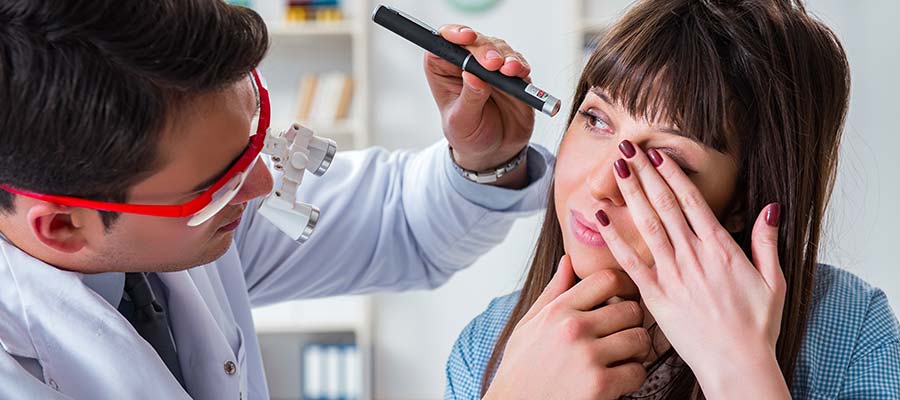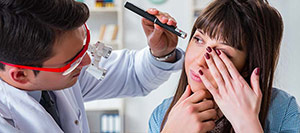Pink Eye Treatment Doctor in Memorial Houston, TX
Many of the bacteria and viruses that cause colds and other diseases, such as ear infections, sinus infections, and sore throats, can also cause pink eye. If the pink eye does not get better after two to three days of treatment, or if it has stayed untreated for a week, then contact Memorial Primary and Urgent Care or book an online appointment. We serve patients from Houston, TX, and surrounding areas.


Table of Contents:
How long is pink eye contagious?
How long does pink eye last?
Will pink eye go away on its own?
Should I see a doctor for a pink eye?
Why did I get pink eye overnight?
When you have pink eye, also known as conjunctivitis, you remain contagious for as long as you have symptoms. This usually lasts several days to two weeks. Pink eye is contagious, whether it is bacterial or viral, and the risk of spreading the virus increases when there is drainage from the eye.
If you are taking antibiotics, the risk of spreading pink eye diminishes. After 24 hours of antibiotic use, the spread of your pink eye infection significantly decreases.
To prevent pink eye from spreading, it’s strongly urged that you avoid touching your eyes with your hands. It’s also important to wash your hands well and often. You should avoid sharing makeup or other personal care products with others.
In most viral pink eye cases, the infection is mild and will clear up within one to two weeks. However, some cases of viral conjunctivitis can take up to two to three weeks to fully clear up. In these circumstances, antiviral medication can be prescribed. Bacterial conjunctivitis typically lasts two to five days but can take up to two weeks to resolve completely. Antibiotic treatment is often recommended to speed up recovery.
Additionally, there are non-contagious forms of pink eye that occur due to allergens or irritants. In the case of allergic conjunctivitis, the symptoms will last until the allergen is removed or sufficiently avoided. Similarly, irritant or traumatic conjunctivitis resolves after the irritant is removed; however, symptoms may linger for some time, depending on the severity of the irritation.
Regardless of the type of conjunctivitis you have, seeing a healthcare provider will help you expedite your recovery and manage your symptoms with ease.
Yes, in cases of viral pink eye, the infection typically clears up without medical intervention within one to two weeks. However, if your symptoms are bothersome, it is advised to see a healthcare provider to err on the side of caution.
Bacterial conjunctivitis may also resolve on its own, but treatment with antibiotics is often recommended to speed up recovery and reduce the risk of complications. In addition, most cases of irritant and allergic conjunctivitis can resolve on their own once the irritant or allergen is removed.
While conjunctivitis can clear up on its own, seeking medical advice is recommended to identify the cause of the infection. By seeing a doctor, you can determine the best course of action when it comes to treatment, whether it be a monitoring approach or antiviral or antibiotic medications. Coming in to have your eye looked at is especially important if your symptoms worsen or persist for longer than two weeks.
If you have pink eye, it’s a good idea to see a healthcare professional to determine what’s causing your symptoms and the best way to manage them. If you experience severe eye pain, changes in vision, sensitivity to light, or symptoms that worsen despite home care, it’s urged that you see a doctor.
The medical professional will diagnose the type of pink eye you have and provide recommendations on how to manage your discomfort to ensure a speedy recovery. Overall, seeing a doctor about pink eye is beneficial as they can provide you with guidance on how to best take care of yourself and prevent the spread of the infection to others.
Viral or bacterial conjunctivitis can develop rapidly and cause you to wake up with bothersome symptoms. It usually takes hours or days for symptoms to appear after the initial infection. These forms of conjunctivitis are highly contagious. So, if you have been in contact with someone with pink eye recently, it could be the cause of your sudden symptoms. Allergic or irritant conjunctivitis can also occur suddenly, especially if you come into contact with allergens such as pollen, dust, pet dander, or certain chemicals. If an allergen or irritant comes into contact with your eye right before bed or during the night, it’s likely the reason why you’ve woken up with an inflamed eye. If you’ve suddenly found yourself with pink eye, the experts at our clinic can help you manage your symptoms and get on track to a fast recovery. For more information, contact us today or book an appointment online. We serve patients from Houston TX, West University Place TX, Bellaire TX, Jacinto City TX, Galena Park, TX, and South Houston TX.






